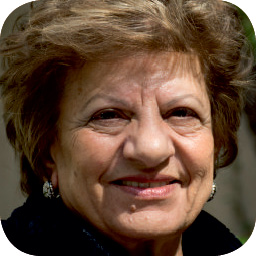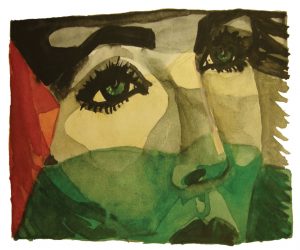My spirituality is based on equality, human dignity, and human rights. So, as a Palestinian woman struggling to transform structures of violence and domination, I find that all struggles for justice are interrelated.
I started this journey with others and for others in order to achieve some of these goals. It has been a long journey, but we have not been deterred by physical pain, anxiety, or hurt. We have wanted to affirm life by upholding the ideals of equality, human dignity, and human rights at the national, political, economic, social, cultural, religious, and environmental levels. Sometimes the pain of sexism is eclipsed by the lack of national liberation, but it is crucial to remember that we, as Palestinians, cannot become free if women are not free.
Some women think that they are adequately involved in society through the services they offer in their homes as well as through various jobs within their communities. But is it truly enough to serve without being part of the decision-making processes at work, in church, and in society as a whole? When it comes to their own rights, many women have not yet experienced an awakened conscience, which is why they continue to participate in and reinforce the structures of injustice.
The call for justice is heard everywhere. It is neither an empty slogan nor a liturgical anthem. Rather, it is a cry from the heart, a cry out of humiliation and oppression, and a cry for a new future – to begin immediately.
Will our religious structures or our churches hear the cry for liberation and suffer with those who suffer?
Many people had hoped that decades of solidarity with women encouraged by the United Nations and the churches would lead to radical transformation of our societies and a positive change in the situation of women who suffer from poverty, economic exploitation, sexism, racism, and violence. The sad truth, however, is that not much has changed. In fact, most women today face more difficult conditions than they did 15 or 20 years ago in many parts of the world because of poverty and war, such as that waged against Gaza and the wars in many other countries in the Middle East.
We should also be aware that religion, in both its progressive and reactionary forms, has entered into and shaped almost every major crisis in our world, and it has influenced our daily lives as well. On the progressive side, there are activists and peace movements that work for a radical alliance with the poor and the oppressed. On the reactionary side, narrowness and chauvinism in every religious tradition easily allies itself with chauvinistic national movements. Religion is a problem in cases where its structures of dominance have oppressed Palestinians, in general, and women, in particular. But religion has also been a solution when its vision of liberation and equality has generated powerful movements for political, social, and economic change.
I have learned that the struggle for justice is one struggle, and that an action taken to defend or strengthen human rights in one place is an action on behalf of people everywhere. I now understand that our global responsibilities and relationships have a focal point, and no matter where we live, we can work for human rights. A kinship is formed as we create a prototype of a new community that knows no national, racial, gender, or sexual boundaries.
The women’s movement for liberation, both locally and globally, has touched me most deeply and has forced me to change since I believe that women’s roles and status lie at the heart of every society.
We have so much work to do in order to unlearn what we have learned. We need to look out from different windows, which is not always simple to do. Given the way that women educate and raise their families, women themselves often seem to reinforce structures of injustice. Instead of utilizing the resources of co-powering and cooperation, women often use their power to dominate and coerce, which leads to the oppression and marginalization of others. Power, however, can be used in a constructive way to control one’s life and to influence one’s community to act justly.
Unless we are sustained by a commitment and a spirituality that is deeper than the ethics of revolution alone, this journey of struggle to change for the better, to transform ourselves and our societies, can lead to fatigue and burnout. The act of helping or redeeming a human being created in the image of God is a redemptive act, especially for women. It is an act to reclaim one’s lost wholeness and sense of self-worth.
Freedom is not a new theme in Christian theology. The gospel itself is a message of liberation in Jesus Christ. It is good news to all people in every situation and in every place of internal and external oppression. Situations may vary, but all of us want to be alive and free. We all struggle for the freedom to shape our own future and participate in the search for what it means to be children of God.
Palestinian women live and work in a very traditional society where the “do’s” and “don’ts” for women are made very clear. Often our ministry depends on how well we conform to the expectations of our own people. If we don’t meet these expectations, our ministry is not validated or even taken seriously. Unfortunately, most people cannot look beyond the superficial. So, if I have any truth to communicate, I have to be careful not to lose the respect of the community. I therefore live my life in my traditional society on one hand, and in the ongoing, ever-changing world, on the other.
The women of Palestine are often referred to as the “glue of our society.” We are the ones who hold together our families, while our husbands, brothers, and sons are in prison, deported, wounded, or killed, or perhaps have migrated for economic or political reasons. As partners, we continue to be critically involved in a mostly nonviolent struggle. We continue to work, support, and build for a new future that, through our liberation, will liberate the entire Middle East and all of humanity. It is this hope that inspires us and leads us. It is this hope that will turn the sufferings into a new dawn for all humanity. And it is this hope that allows us to see the image of God in everyone.
Jean Zaru serves as the Presiding Clerk of the Religious Society of Friends. A teacher of ethics and religion, Jean is one of the founding members of Sabeel and has been the vice president of its board for 25 years. She has served on the boards of many local and international institutions and has published many articles and a book, Occupied with Nonviolence: a Palestinian Woman Speaks.



